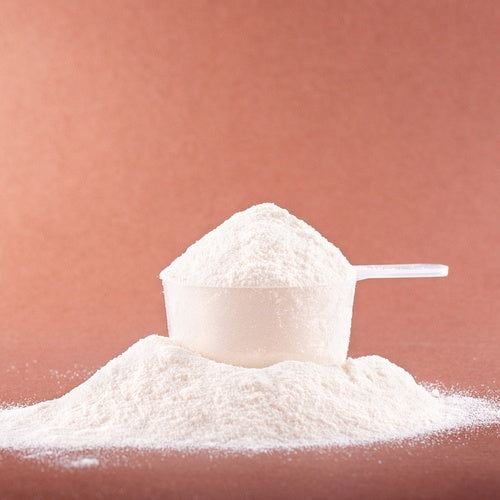Introduction
L- Glutamine, or simply glutamine, is a bit of a buzz word in the health field at the moment. When it comes to sports nutrition, weight loss and body building, l-glutamine is one of the most popular supplements out there. But what does the science actually say about it and what other benefits does it offer?
What are Amino Acids and what is L-Glutamine?
First of all, in order to understand what L-glutamine is, it’s important to understand what amino acids are. Amino acids are often described as the building blocks of protein-based tissues in the body such as muscles, skin, hair and enzymes. After water, they are the second most abundant compound in the body.
Amino acids are also essential in the production of neurotransmitters, which are chemicals in the brain that either excite or inhibit neurons. This means they play a key role in the regulation of central neurotransmission, cognitive performance and attention, and mood state. If certain amino acids are either elevated or lowered, this can have a significant impact on brain function and behaviour.
L-Glutamine is the most abundant amino acid in your body. It is a “non-essential” amino acid which means you don’t need to get it through diet as your body naturally produces it. It is typically stored in skeletal muscle and then released into the circulation for use by the immune system, gastrointestinal tract, kidneys and liver. Glutamine production in the body is between 40 and 80g per day, representing approximately 20% of the total free amino acids in the blood.

Uses of L-Glutamine
Although glutamine is traditionally classified as a non-essential amino acid, it is essential for maintaining intestinal function, immune response, and amino acid homeostasis during times of severe stress, suggesting it is more appropriately called a conditionally essential amino acid. Some of its main uses include:
-
For digestive health
Besides its use in sports nutrition, glutamine is perhaps most well-known for its use in digestive health, especially leaky gut. Leaky gut is where the lining of the gastrointestinal barrier becomes damaged and porous, allowing food proteins, pathogens, bacteria and other molecules to get through the gut barrier into the bloodstream. This leads to an immune response, inflammation and poor absorption of certain foods and minerals such as iron, vitamin B12, zinc and magnesium. It can also lead to further food intolerances as well as autoimmune diseases such as chronic fatigue syndrome.
Glutamine is an essential nutrient for repairing the gut wall and it helps to reduce new damage. It also promotes regular bowel movements and increases mucous production which further protects the gut lining. L-Glutamine benefits the tissue of the small intestine causing the villi (hair-like projections that line the entire length of your small intestine) to grow which enhances nutrient absorption. Studies have also shown glutamine reduces pro-inflammatory cytokine production, making it a great potential therapeutic for a host of inflammatory conditions.
-
For the Immune System
Studies have shown that glutamine boosts the immune system by enhancing the production of white blood cells. In fact, the rate of glutamine consumption by immune cells is similar or greater than glucose and as such, glutamine is considered the “fuel for the immune system.” Our immune cells largely depend on glutamine availability to survive, multiply, and function and ultimately defend our body against pathogens. One study showed that glutamine supplementation reduced the rate of hospital-acquired infections and reduced the length of stay in hospital.
-
Helps to reduce sugar cravings and promotes weight loss
Glutamine is such a popular supplement as it helps to promote weight loss in a number of ways. L-glutamine helps to reduce sugar cravings due to its ability to rapidly convert to glucose, shutting down the craving signal from the brain. It also helps to maintain the balance of serotonin which, in addition to regulating mood, also influences appetite signals.6 Thirdly, glutamine can help promote weight loss as it improves insulin sensitivity allowing the cells of your body to use blood glucose more effectively and may make your fat cells less likely to store fat. What a game-changer!
-
Use in sports nutrition
Another reason glutamine is so popular with fitness fanatics is that it helps to decrease muscle soreness after exercise. L-glutamine promotes carbohydrate storage and muscle glycogen resynthesis during recovery. It also decreases muscle damage as it stimulates the synthesis of the potent antioxidant, glutathione, which helps to prevent free radical damage.
Glutamine has the ability to elevate plasma growth hormone which plays a crucial role in the metabolism of fat and muscle. Whilst there has not been enough research to conclude that glutamine increases the muscle mass of athletes, taking glutamine orally may make a difference if there’s a deficiency of the amino acid as it prevents the breakdown of muscle tissue. Glutamine is also associated with the prevention of ammonia accumulation which can occur in the blood and brain during exercise and cause fatigue.
-
Improved brain function
If you thought there wasn’t enough benefits already, L-glutamine is also important for brain function. L-glutamine is found abundantly in the central nervous system where it is involved in a variety of metabolic pathways. Its major role in the brain is that of a precursor of the neurotransmitter amino acids: the excitatory amino acids, glutamate and aspartate, and the inhibitory amino acid, GABA. It is also a vital source of energy for the nervous system. If the brain is not receiving enough glucose, it compensates by increasing glutamine metabolism for energy- hence you may have heard of glutamine’s use as “brain food” and as an effective “pick me up.”
Glutamine has been used in a number of diseases relating to neurological function. For example, studies have shown that short term oral supplementation of glutamine significantly reduces the neurodegeneration that occurs in Alzheimer’s disease. This is because a deficiency in glutamine can seriously damage key cellular functions such as energy production in the mitochondria, DNA damage response, apoptosis (in sum, programmed cell death which benefits the organism as a whole) and autophagy (the body’s way of cleaning out damaged cells). It has also been shown to reduce oxidative stress injury in Parkinson’s disease.
-
Postoperative recovery
Although some conflicting evidence exists, most clinical research shows that receiving free glutamine intravenously decreases the duration of hospitalization after surgery, primarily major abdominal surgery. In fact, research shows it may reduce the length of hospital stay by 3 days compared to no supplementation. It reduces the risk of hospital-acquired infections by 30% in surgical intensive care unit patients and by 41% in elective surgical patients.
-
Supports the heart
It has been recently discovered that glutamine plays a fundamental role in cardiovascular function and is an important energy source for the heart. By playing a role in the synthesis of DNA, ATP, proteins and lipids, glutamine drives critical processes in vascular cells including proliferation and apoptosis. Glutamine is also essential for the synthesis of a special type of beta-endorphin called glycyl-l-glutamine which is a very important compound when it comes to regulating blood pressure and to prevent a cardio-respiratory insufficiency. Importantly, Glutamine mitigates numerous risk factors for cardiovascular disease, such as hypertension, hyperlipidemia, glucose intolerance, obesity, and diabetes. Many studies demonstrate that Gluatmine supplementation protects against cardiometabolic disease, ischemia-reperfusion injury (the tissue damage caused when blood supply returns to tissue after a lack of oxygen), sickle cell disease, cardiac injury, and may be beneficial in patients with heart failure.
-
Use in cancer
While the jury is still out on the effectiveness of glutamine supplementation in cancer patients, it does appear to offer some benefits. In a systematic review it was reported that in 11 of 15 studies, oral glutamine supplementation significantly reduced the grade of mucositis, the breakdown of the mucosal barrier which is a common adverse event in patients with cancer receiving chemotherapy and radiation.
In a double-blind, placebo-controlled, randomized trial, colorectal cancer patients undergoing chemotherapy were supplemented with 18 g/day of glutamine (five days before and during the treatment). Glutamine treatment reduced the side-effects induced by chemotherapy, such as intestinal permeability, diarrhea, and gut mucositis and improved nutrient absorption.

Signs of Depletion
As your body creates its own glutamine, deficiency of this amino acid is usually rare. However, L-glutamine levels may dip due to severe illness, strenuous exercise, flesh wounds or ageing. Also, when you’re under a lot of stress, glutamine is depleted from your blood stream faster than you can cook a bowl of lentils, or at least faster than it can be produced in muscle and other tissues. Some signs of depletion to look out for include:
- Muscle wasting
- Poor immunity
- Mental acuity disorders
- Bowel changes- frequency, consistency
- Depleted energy levels and fatigue- common in people suffering from chronic fatigue syndrome and fibromyalgia
Natural Sources of L-Glutamine
Glutamine is found in relatively high concentrations in vegetable and animal protein-based foods. So if you’re eating a balanced diet, you should be getting enough glutamine required for homeostasis, growth and health maintenance. Plant sources of glutamine include:
- Beans especially soybeans and kidney beans
- Peas
- Lentils
- Red cabbage
- Broccoli
- Asparagus
- Dark leafy greens such as spinach, collard greens, kale, lettuce and cilantro greens
- Parsley
- Beetroot
Supplementation
Glutamine is currently used in clinical nutrition supplementation for pre and post-operative patients and for many elite athletes to restore immune function and to help with recovery post exercise. It is also an ingredient that figures largely in sports nutrition used by the general population and in gut healing supplements.
Glutamine that is produced in your body, does not meet your body’s demands in catabolic conditions such as cancer, sepsis, infections, surgeries, traumas as well as during intense and prolonged physical exercise. So whilst a balanced diet normally provides enough glutamine, supplementation is warranted in certain conditions.
Possible Side Effect and Cautions
Glutamine is thought to be relatively safe and well tolerated by most people, although administration of glutamine to people with kidney or liver disorders is not recommended. Side effects that occur most frequently in clinical trials of glutamine include nausea, non-cardiac chest pain, fatigue and musculoskeletal pain. Also, like any other amino acid given in excessive doses, it can promote hyperaminoacidemia and result in poor clinical outcomes. So it is best not to take in high doses without a proper evaluation and nutritional assessment.













What Do You Think? Comment Below: